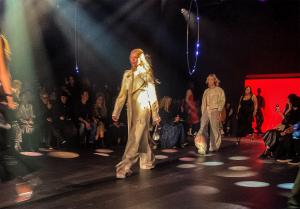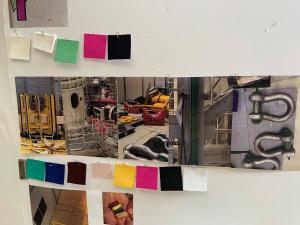A collision of worlds
When asked what he thought about Hearst's passion for fusion, ITER's Head of Communications Laban Coblentz replied frankly, "I know very little about fashion, and to be honest when Gabi wrote to ask about visiting ITER, I will admit that I didn't know who she was. But when she and her team visited ITER, I was stunned because she was the most well-educated layperson on the topic of fusion I had ever met. You could see, on the worksite tour, that she was familiar with the components and features from her reading. It was an inspiring collision of worlds."
Tokamak references were incorporated into the circular designs of the cut-outs in the clothing, the accessories, and even into metallic buttons that resembled components. Isotope shapes were interpreted as rivets on denim. Even the runway was in the form of a donut, with a pink-plasma-hued light show shining circles around the models, and hanging LED rings that pulsed with light and were placed similarly to a tokamak's vertical coils.
Fusion is not just a science story; it is also a human story with the power to ignite the imagination. As Hearst says, "I have deep gratitude for the star-builders that not only deal with one of the hardest challenges in physics—plasma—but also, through their eyes, see a future that is as bright as the stars we are made of."



